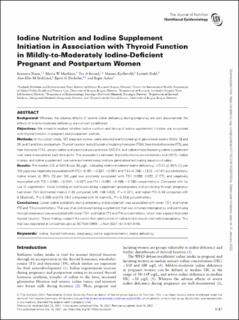| dc.description.abstract | Background: Whereas the adverse effects of severe iodine deficiency during pregnancy are well documented, the effects of mild-to-moderate deficiency are not well established.
Objectives: We aimed to explore whether iodine nutrition and timing of iodine supplement initiation are associated with thyroid function in pregnant and postpartum women.
Methods: In this cohort study, 137 pregnant women were enrolled and followed up at gestational weeks (GWs) 18 and 36, and 3 and 6 mo postpartum. Thyroid function tests [thyroid-stimulating hormone (TSH), free triiodothyronine (fT3), and free thyroxine (fT4)], urinary iodine and creatinine concentration (UIC:Cr), and iodine intake (including iodine supplement use) were measured at each time point. The associations between thyroid hormone concentrations and UIC:Cr, iodine intakes, and iodine supplement use were estimated using multiple generalized estimating equation models.
Results: The median UIC at GW18 was 94 μg/L, indicating mild-to-moderate iodine deficiency. UIC:Cr (β; 95% CI) per 100 μg/g was negatively associated with fT3 (−0.191; −0.331, −0.051) and fT4 (−0.756; −1.372, −0.141) concentrations. Iodine intake (β; 95% CI) per 100 μg/d was positively associated with TSH (0.099; 0.022, 0.177), and negatively associated with fT3 (−0.084; −0.0141, −0.027) and fT4 (−0.390; −0.599, −0.182) concentrations. Compared with no use of supplement, those initiating an iodine-containing supplement prepregnancy and continuing through pregnancy had lower TSH (estimated means) (1.35 compared with 1.68 mIU/L, P = 0.021), and higher fT3 (4.48 compared with 4.28 pmol/L, P = 0.035) and fT4 (15.2 compared with 14.4 pmol/L, P = 0.024) concentrations.
Conclusions: Lower iodine availability during pregnancy and postpartum was associated with lower TSH, and higher fT3 and fT4 concentrations. The use of an iodine-containing supplement that was initiated prepregnancy and continuing through pregnancy was associated with lower TSH, and higher fT3 and fT4 concentrations, which may suggest improved thyroid function. These findings support the notion that optimization of iodine intake should start before pregnancy. | en_US |

